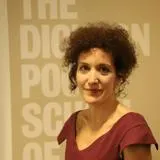Winning this prize is fantastic and so encouraging. As a legal scholar employing empirical methods, I have sometimes felt slightly uncomfortable as I am bridging different disciplines. This prize recognises that my research is making a difference and for that I am extremely delighted.
Dr Dionysia Katelouzou, Reader in Corporate Law
08 October 2021
Law academic wins prize for paper on stewardship codes
Dr Dionysia Katelouzou wins international award for her research on corporate governance and stewardship.

Dr Dionysia Katelouzou, Reader in Corporate Law at The Dickson Poon School of Law, and her co-author Professor Mathias Siems, from the European University Institute, have been announced as the winners of the 2021 Cleary Gottlieb Steen & Hamilton Prize for Best Paper in the European Corporate Governance Institute’s Law Working Paper Series.
Their paper, The Global Diffusion of Stewardship Codes, found that while many of the principles contained in the UK Stewardship Code 2012 have been echoed in other codes, there has also been some divergence.
Stewardship codes have gained attention over the past decade as a way of encouraging institutional investors to focus on long-term benefits and so use their capital to deliver a more sustainable approach to business.
The UK Stewardship Code was launched in 2010 and in the decade since codes have been adopted in nineteen jurisdictions from all six continents. Further stewardship codes have been developed at international and regional levels.
Dr Dionysia Katelouzou: “While there is clear evidence of formal diffusion of the UK stewardship principles around the world and most stewardship codes share the same seven principles as the original UK Code, there is in fact only a “mirage” of global uniformity. For instance, some codes place a stronger emphasis on investment management aspects of stewardship, while others - despite being ostensibly similar to the UK Code - were adopted to signal compliance with “good” global corporate governance standards.”
The impact of these codes is hard to judge, says Dr Katelouzou: “The converging verdict in both academic and business circles seems to be that the original UK Code did not foster substantially greater engagement on the part of institutional investors in corporate governance. In many other jurisdictions that adopted UK-style stewardship codes it is not institutional investors but controlling blockholders who have a substantial portion of public companies, and this is why UK-style codes addressed to institutional investors in those jurisdictions can be only expected to have very little impact.
“To complicate matters even further, the impact of the stewardship codes also depends on the nature of the issuer/drafter of the code and the enforcement mode. The UK’s Code was promulgated by a quasi-governmental regulator (the Financial Reporting Council), but most other codes have been developed by fully private organizations and they are completely voluntary in nature. This has a knock-on effect on the impact of stewardship codes which is also contingent on jurisdiction-specific factors, including ownership structures, culture and politics.”
Despite questions over impact, Dr Katelouzou thinks the increased scope of the revised UK Code suggests codes can still be an influential lever in delivering more sustainable business: “The most recent revision of the UK Stewardship Code in 2020 aims to encourage inclusion of environment and social factors – particularly climate change – in addition to governance. Even though predictions are a risky game, this shift of the UK Code from a corporate-governance-centric conception of stewardship to environmental and social factors alongside the new emphasis on outcomes-focussed stewardship is likely to have a meaningful impact both domestically and globally. Within the UK, the new Code can support concurrent regulatory attempts to combat climate change. Outside the UK, the new Code, following the path of the original Code, can be the new norm-exporter.”
The European Corporate Governance Institute (ECGI) is an international scientific non-profit association providing a forum for debate and dialogue between academics, legislators and practitioners, focusing on major corporate governance issues.
Dr Katelouzou and Professor Siems’ paper will be presented at the ECGI Annual Members’ Meeting on Thursday 28 October (online). Registration for this session will be open to the public, with details published on the ECGI website.

